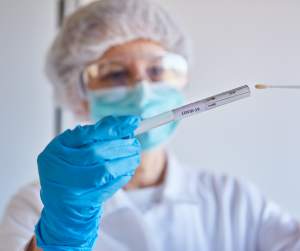Testing for COVID-19
by Dr. Jeff Anthony
There is a lot of talk about testing for COVID-19 and rightly so. We now understand that the SARS-CoV-2 virus is relatively easily spread by people who have the disease and have symptoms. Yet people can also have the disease but remain asymptomatic. This is important to know. It helps identify all potential sources of COVID-19. So, there is value in identifying people that have the disease and all who can spread it.
Types of tests.
There are 3 main types of testing. The first two identify if you have an active infection with COVID-19 and are obtained by a nasal or throat swab. The Molecular test (PCR) may take longer to get results (1-7 days) but is more accurate. The Antigen test can give you results in an hour, and if it’s positive, is accurate, but if negative, you could still have COVID-19. You may then be requested to do the Molecular test to confirm negativity. This chart from the FDA discusses each of these tests in greater detail.
The third is the Antibody test, which is a blood test and can indicate if you’ve had a COVID-19 infection by looking at your Immunoglobulins which are produced by your B cells. It is not a good test to see if you are infected now. This test is still looking for universal approval because the interpretation can be difficult and controversial. It may take 3-5 days for antibodies to develop in your blood, and they may disappear in a few weeks. We are still not sure if these antibodies confer immunity, and if so, how long it lasts. We also know that your body may form cell mediated immunity, which is not from the antibodies, but from specialized T cells.
When should you test for COVID-19?
There is current controversy regarding the timing of testing since the CDC has revised their recommendations in the last couple weeks. Testing of asymptomatic individuals is, at this point, a little controversial. The CDC has recently (Aug 24, 2020) changed their perspective on testing of asymptomatic people. If asymptomatic, they recommend testing for COVID-19 only if you are a vulnerable individual with cardiac or pulmonary issues, diabetes or other immune deficiencies, hypertension, obesity, or are recommended to test by a healthcare professional.
The current recommendations for COVID-19 testing from the CDC include testing for:
- People who have COVID-19 symptoms
- People who have had close contact with a confirmed COVID-19 positive patient. Close contact is defined as being within 6 feet of an infected person for at least 15 minutes.
The above testing can help with not only the management of the disease but reduce the spread as well. We’d like to emphasize that a person who is infected, but has no symptoms, can also spread COVID-19 to others. If you have had contact with a person testing positive for COVID-19, we’d like to know if you have the disease and whether or not you have symptoms. As your medical providers, we remind you to quarantine, follow COVID-19 Protocol, as well as participate in contact tracing to identify who you may have exposed to help others minimize the spread.
The role of the medical community.
Our goal in the medical community is to take care of patients that need care and limit the spread of the disease. 80% of people infected with COVID-19 have mild to no symptoms and can manage their disease from home without medical intervention. We encourage these people to contact their provider by phone or Televisit to get help with management, but not come into the medical office, Urgent Care or Emergency Room. This prevents infecting others. We also encourage them to follow COVID-19 protocol: social distance, masks, hand washing, and isolation. If your symptoms become more serious with shortness of breath, or partial pressure oxygen (PO2) is less than 92, then your physician will evaluate your need to go to the hospital.
What about traveling by air?
Check with your airline, as well as your intended destination before planning travel for their specific rules for COVID-19 testing. In some cases, quarantine is required. Also check any special requirements for COVID-19 testing and which test they require, the Molecular or Antigen testing. Be aware that the Molecular test may take up to a week to get the results so you can plan accordingly.
Sports Pre-Participation Exam (PPE)
by Dr. Elizabeth Williams
Scheduling an appointment for your athlete prior to the start of their season starting is a time-honored tradition. You may find yourself wondering why or when this practice started. Screening individuals prior to starting school dates back to the 1890’s in Britain. The practice went through several updates throughout the years and has been widely adopted across the United States. The goal of the PPE is to promote athlete health and safety; including evaluation for any conditions that may be life threatening. It’s tough for us to consider these young athletes in the prime of their life as being vulnerable, but unfortunately there are devastating cases every year of athletes who die during practice or competition.
One of the leading causes of death during athletic competition is underlying cardiovascular (heart) conditions. These conditions can be silent and go undetected until the athlete suffers from sudden death. One tool to further assess an athlete’s risk for cardiac complication is to perform an ECG (electrocardiogram). This is a quick, painless, in-office test that looks at how the electricity runs through the heart.
Tips To Protect Your Athlete
- Schedule the pre-participation exam prior to the start of the season
- Add an ECG to help detect cardiac conditions that increase risk of sudden death
- Be proactive to promote the health and safety of the athlete
Decades of research has established and refined criteria to help identify changes in athletes that indicate the need for more evaluation. If your athlete has findings that need more evaluation, they still may be able to compete. The vast majority of athletes with an abnormal ECG are able to return to sport. While screening cannot detect every case, it identifies more athletes at risk than asking questions alone. Adding an ECG to the PPE is becoming more common. SDSM is committed to being leaders in the field of sports medicine. Therefore, we are offering this additional heart screening to our young athletes ages 14 through 32. For more information, just ask your doctor during your athlete’s next physical or pre-participation exam.
Alcohol and You
By Linda Illingworth, RDN
Alcohol is one of the more challenging food components we consume. We hear that alcohol can be good for us and increase our longevity like the centenarians living in Blue Zones. Yet, alcoholic beverages still remain a toxin at their core despite the vitamins and antioxidants they might contain.
The dietary guidelines for alcohol consumption recommend that alcohol should not contribute more than 10% of your total calories each day. Not only does this curtail a host of medical problems, it helps prevent alcohol from replacing nutrient dense foods that would provide vitamins, minerals, antioxidants, fiber and other macro nutrients. Most of the calories contained in alcohol are in the form of ethanol and residual carbohydrate that did not ferment. Since the body cannot store ethanol this makes alcohol the first fuel burned by the body to meet energy needs. Any calories consumed in excess will be burned later, putting them at greater risk for being stored as fat.
What makes alcohol so tricky nutritionally is not as obvious as the calories. Alcohol is a behavioral disinhibitor. Disinhibition is a lack of restraint and shows up as impulsivity and poor risk assessment. It affects our cognitive and perceptual skills, as well as motor, instinctual, and emotional skills. This means that alcohol can influence your decisions when choosing a meal, whether to have dessert, another glass of wine or both. This impairment is easier to understand in the context of a party or bar where people are speaking louder and laughing more freely over the course of a drink or two.
Alcohol is also an appetite stimulant. Cocktail hours are sometimes available at assisted living facilities to help stimulate waning appetites and lift spirits. Restaurants increase profits by taking your beverage order before asking about your main meal. Combining impaired decision making and appetite stimulation is a green light for overindulging. If you struggle at mealtimes with over-eating, or wonder why you can’t stick to a healthy food choice, it could be due to an increased appetite and lack of restraint caused by alcohol consumption.
Learning to better manage imbibing can have a big impact on your health. Alcohol affects not only your weight but can ramp up your cholesterol and blood sugar as well. And by no means are we suggesting you begin drinking. If you don’t currently drink, there is no evidence that adding alcohol will improve your health. For those with addictions, abstinence is paramount to a healthy life.
Tips for reducing alcohol consumption:
- Dining out: Order a non-alcoholic beverage FIRST! Wait to order alcohol when your soup or salad arrives. If you are only having an entrée, ask that your alcoholic beverage be served with your meal or order your beverage when your entree arrives.
- Define drinking days: Limit alcohol consumption to a few days a week. Avoid daily drinking to give your liver time to recoup and make less cholesterol. Daily drinking can create insulin resistance and permanently raise blood sugar.
- Enjoy your beer, wine, or cocktail then toss the bottle or put the glass out of sight. The smell and sight can leave you wanting more.
- Replace alcohol with kombucha. Kombucha contains 1/2 as many calories and should only contain trace amounts of alcohol, if any.
- Alternate alcoholic beverages with water, sparkling water or iced tea. This helps curtail the dehydrating effects of alcohol and replaces alcohol with calorie-free alternatives.
- BYOAFB—Bring your own alcohol-free beverage to gatherings. Take kombucha, sparkling waters, or flavored tea to parties and have them on hand for guests when hosting. You’ll be more likely to have one too.
Sticking to the new guidelines.
If you currently toss back more than one drink a day, it’s best to make a plan. Some simple structure around eating and drinking can make a big difference in feeling satisfied versus feeling deprived. Even your attitude can play a role. Think of cutting back or eliminating alcohol as adding other aspects to your life rather than taking away from it. If you find it too difficult to cut back, that can be a sign you need to talk to someone about it. We are always here for you to discuss any aspect of your health including alcohol consumption. Give us a call and we can help with reassurance, referral to recovery specialists, and therapists.
Meet Your Providers: Dr. Shannon Cheffet 
It’s good to know a bit about your healthcare provider. It can help you decide who you might like to take care of you, and makes office visits more relaxed and comfortable. In the coming weeks we will feature one of our dedicated providers so you can get a glimpse of what makes our team so special. This week, please meet Dr. Shannon Cheffet!
Dr. Cheffet discovered her calling for medicine at the age of seven, while being treated at a local burn unit. She understood at a very young age, that healing is about more than the medication or procedure, it is about the connection a patient feels with their physician. She completed her under-graduate degree in Microbiology at UC Davis and went on to receive her Doctor of Osteopathic Medicine degree from Western University of Health Sciences. (Learn more about Osteopathic Medicine here) To follow her dream of treating patients of every age, she completed a dual residency in Internal Medicine and Pediatrics at Loma Linda University Medical Center.
With a special interest in wellness, Dr. Cheffet strives to demonstrate the balance of a dedicated career by leading an active lifestyle. When not in the office, she can be found cruising San Diego waters on a paddle board, attending soccer and lacrosse games, and heading to the mountains to hike with her husband and their rescue dogs. The family’s rabbit and two tortoises provide balance with quieter family times at home. She has recently joined the National Charity League with her daughter to help pass on her love of philanthropy. In addition, she serves on the membership board for Osteopathic Physicians and Surgeons of California and enjoys giving lectures at their annual conferences. She has also served as an expert physician for the Osteopathic Medical Board of California.
Dr. Cheffet’s experience as both a practitioner and a mother of four have reinforced her passion to treat the entire person, not just their illness. Her clinical experience is diverse, from serving as a medical director of a local Community Health Center system to providing inpatient care at Sharp Memorial and Sharp Mary Birch hospitals. She joined San Diego Sports Medicine & Family Health Center (SDSM) in 2013, where she has been honored to continue to build deep relationships with her patients, earning Top Doctor recognition from San Diego Magazine in 2016 and 2019.
Following her calling for whole-person care and wellness, Dr. Cheffet is now working at SDSM’s newest wellness clinic, Lifewellness Institute in Liberty Station in Point Loma. Continuing the high-quality medical care that is the trademark of San Diego Sports Medicine & Family Health Center, Dr. Cheffet is developing a new opportunity for patients called Premier Primary Care. The program allows her to communicate directly with patients, ensure same or next day care, and work more closely with patients to meet their wellness goals. If you’d like more information on how to work with Dr. Cheffet in this special program please email ppc@sdsm.com. We will be happy to connect with you.
Stay safe San Diego.
Don’t put off important checks on your health especially if you have diabetes, asthma, COPD, heart problems, impaired immune function, difficulty getting enough sleep, or are experiencing high levels of stress. It’s important to maintain your health if you have a chronic condition. Ask us about COVID-19 testing and let us help manage your symptoms if you get sick. We are here for you whether you need a well check, advice on testing or care for COVID-19, or have any other health care need. Our Urgent Care office in Pacific Beach is always available to you. Simply call first so we can be sure to see you safely in clinic.
SDSM continues to practice all CDC recommended infection control measures. Clinics disinfect between each patient interaction with CDC approved disinfectants, employ proper social distancing measures, and follow additional CDC infection control guidelines. When visiting our clinics you can expect fewer people in waiting rooms, to wear a mask or face covering, use hand sanitizer on entry, and be screened for COVID-19 symptoms before entering patient care areas.
We are experts in telemedicine and can coach you on self-care at home, provide advice on medications or necessary prescriptions, and can evaluate your need for an in-person visit. We continue to recommend that anyone with cold/flu/COVID-19 symptoms and patients at increased risk of complications from COVID-19 are best addressed through telemedicine appointments.
Please call us if you feel ill. Whether you have been practicing stay at home measures, traveling, or out in the community, take care to wear a mask, practice a minimum of six foot social distance from others, wash your hands frequently, and avoid touching your face, mouth, and nose. Working together, we can help you to stay safe, healthy, and thrive.
Yours in health,
The Physicians and Staff of San Diego Sports Medicine and Family Health Center

